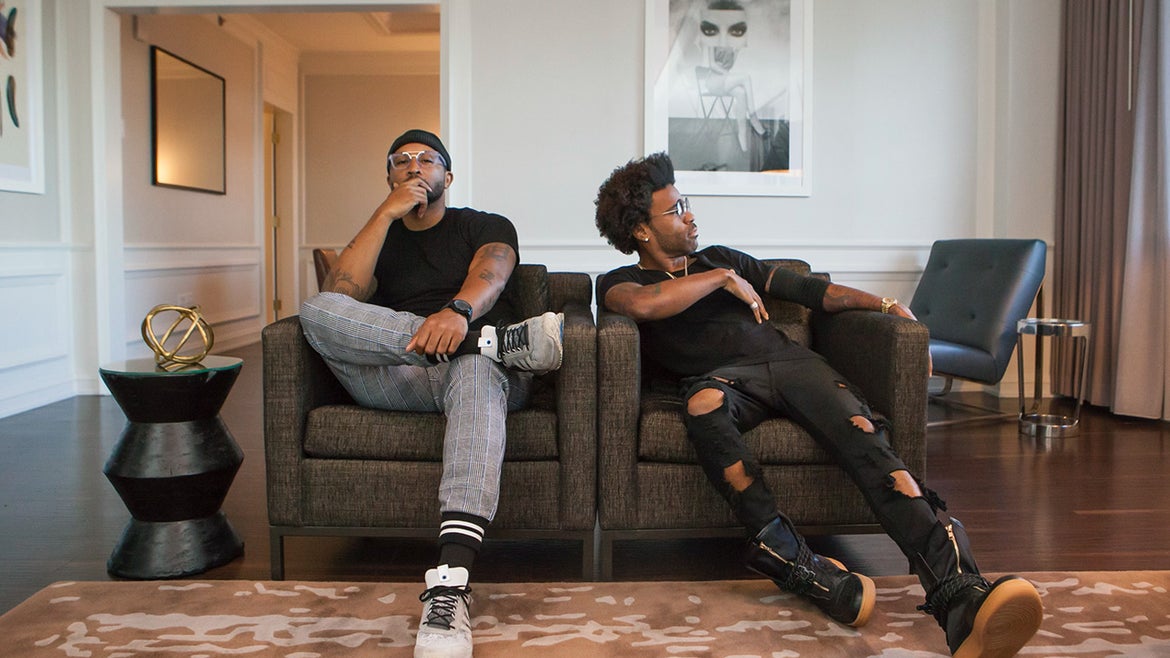Civic Cipher, a radio show hosted by Ramses Ja, Q. Ward, and their executive producer, Maggie B. Knowin, aim to protect Black and brown people by owning the trademark.
The owners behind the ‘White Lives Matter’ trademark don’t own it for the reasons you may think they do.
Since the controversy of Ye's ‘White Lives Matter’ T-shirts, Inside Edition Digital spoke to one of the two Black radio show hosts that currently owns the trademark.
Civic Cipher, a radio show hosted by Ramses Ja, Q. Ward, and their executive producer, Maggie B. Knowin, currently holds the trademark for the infamous ‘White Lives Matter’ slogan.
The show's goal is to empower Black and brown voices and host discussions on topics that may be difficult, relating to society and culture, but that are important to have. The show was created in 2020 as a response to the desperate call to action and the need for change after the murders of Breonna Taylor, George Floyd, and Ahmaud Arbery.
In 2016, the Southern Poverty Law Center declared 'White Lives Matter' a hate group that was formed as a racist response to 'Black Lives Matter' with the aim to promote the white race.
Inside Edition Digital spoke to host Ramses Ja about the radio station's decision to hold the trademark on the controversial slogan.
“We are not trademark people, but we will do our best to represent the interests of Black and brown people for the rest of our lives,” Ramses tells Inside Edition Digital.
The radio show hosts are not the first to be owners of the controversial slogan that arose in response to ‘Black Lives Matter’.
They were approached by a listener, who wished to remain anonymous, about taking over the slogan that they had been the owner of prior to the radio show.
“The reason this person asked us is because that person didn't feel like they were the right person to be responsible for decisions pertaining to the future of that mark,” says Ramses.
Knowing that this would not be an easy decision, the hosts discussed whether or not to take on the responsibility of being the owners of the trademark.
“We came to the realization that this was perhaps right up our alley. We have committed to being responsible for speaking to and being activists in spaces where it's sometimes uncomfortable,” says Ramses about the decision to take the trademark.
On the topic of Ye and his recent behaviors and actions, including the usage of the slogan on shirts he’s sported in public, Ramses shared his thoughts.
“I remember Kanye West being a person who stood up for Black people,” he says, then recalls Ye’s statement, "George Bush doesn't care about Black people."
“Then I saw Kanye West put the Confederate flag on his shirts at a Yeezy store, and then I saw Kanye West some years later wear a MAGA hat, and then I saw Kanye West wear a trademarked phrase on his shirt,” he says.
“I think I know what problematic behavior looks like. And so we are not in the business of hate on this show. So I will do my best not to say anything damaging to that man,” he says. “That is my brother, for better or worse, and I wish him well, but this maneuver is about protecting our Black and brown communities.”
With Ye using the trademarked slogan on T-shirts, he is unable to sell them due to the prior owner and now the show owning the trademark.
“This maneuver, I don't believe, was intended to cause harm to [Ye], but rather to prevent him from causing harm to other folks. And that's perhaps the spirit that I think that we're moving in,” he says.
“The two highest profile entities associated with this mark are one very famous artist, and this radio show,” says the radio show host.
“So one of those entities recognizes the hurt that this can create, recognizes how triggering this can be, and the other one, from what I understand, thinks it's something that is like a part of fashion culture, fashion week, that sort of thing,” he tells Inside Edition Digital.
When it comes to ever selling the trademark, Ramses makes it clear that the decision to own it wasn’t for monetary purposes, unless there was a way to benefit the Black and brown communities on a grand scale.
“At present, we are not interested in selling, assigning, anything like that. We were asked to be stewards, we were asked to be deciders. We're asked to sit on this and take all of the smoke,” he says.
"Okay, if we got $1 million, or $10 million, and we donated half to this NAACP, they'd be able to fight battles that perhaps are a bit more pressing in Black and brown communities. Battles like voter suppression initiatives. They'll fight battles like police reform, and environmental racism, ways to fight back on things like that, that really have real life and death outcomes for Black and brown people,” Ramses says.
While owning the trademark as Black people comes with a moral weight, Ramses believes that the radio show is capable of bearing that weight and keeping the slogan from falling into the wrong hands.
“I'll speak for me, Maggie, and Q, that we feel responsible, feel a tremendous sense of responsibility to live this moment well, and to be excellent stewards, guided by a truth that is based in love, and that addresses hate in a meaningful and impactful way,” Ramses shared.






